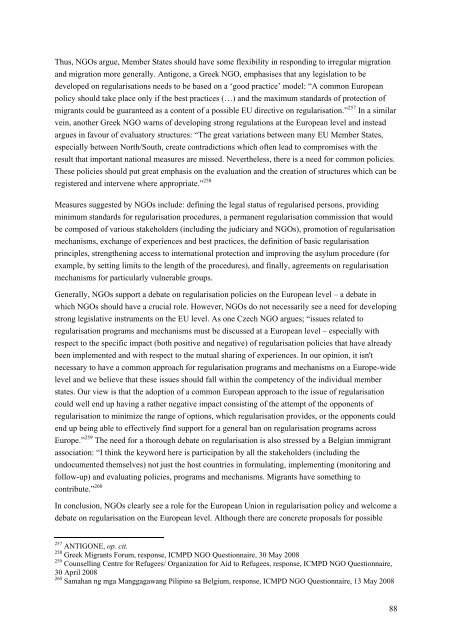REGINE Regularisations in Europe Final Report - European ...
REGINE Regularisations in Europe Final Report - European ...
REGINE Regularisations in Europe Final Report - European ...
Create successful ePaper yourself
Turn your PDF publications into a flip-book with our unique Google optimized e-Paper software.
Thus, NGOs argue, Member States should have some flexibility <strong>in</strong> respond<strong>in</strong>g to irregular migration<br />
and migration more generally. Antigone, a Greek NGO, emphasises that any legislation to be<br />
developed on regularisations needs to be based on a ‘good practice’ model: “A common <strong>Europe</strong>an<br />
policy should take place only if the best practices (…) and the maximum standards of protection of<br />
migrants could be guaranteed as a content of a possible EU directive on regularisation.” 257 In a similar<br />
ve<strong>in</strong>, another Greek NGO warns of develop<strong>in</strong>g strong regulations at the <strong>Europe</strong>an level and <strong>in</strong>stead<br />
argues <strong>in</strong> favour of evaluatory structures: “The great variations between many EU Member States,<br />
especially between North/South, create contradictions which often lead to compromises with the<br />
result that important national measures are missed. Nevertheless, there is a need for common policies.<br />
These policies should put great emphasis on the evaluation and the creation of structures which can be<br />
registered and <strong>in</strong>tervene where appropriate.” 258<br />
Measures suggested by NGOs <strong>in</strong>clude: def<strong>in</strong><strong>in</strong>g the legal status of regularised persons, provid<strong>in</strong>g<br />
m<strong>in</strong>imum standards for regularisation procedures, a permanent regularisation commission that would<br />
be composed of various stakeholders (<strong>in</strong>clud<strong>in</strong>g the judiciary and NGOs), promotion of regularisation<br />
mechanisms, exchange of experiences and best practices, the def<strong>in</strong>ition of basic regularisation<br />
pr<strong>in</strong>ciples, strengthen<strong>in</strong>g access to <strong>in</strong>ternational protection and improv<strong>in</strong>g the asylum procedure (for<br />
example, by sett<strong>in</strong>g limits to the length of the procedures), and f<strong>in</strong>ally, agreements on regularisation<br />
mechanisms for particularly vulnerable groups.<br />
Generally, NGOs support a debate on regularisation policies on the <strong>Europe</strong>an level – a debate <strong>in</strong><br />
which NGOs should have a crucial role. However, NGOs do not necessarily see a need for develop<strong>in</strong>g<br />
strong legislative <strong>in</strong>struments on the EU level. As one Czech NGO argues; “issues related to<br />
regularisation programs and mechanisms must be discussed at a <strong>Europe</strong>an level – especially with<br />
respect to the specific impact (both positive and negative) of regularisation policies that have already<br />
been implemented and with respect to the mutual shar<strong>in</strong>g of experiences. In our op<strong>in</strong>ion, it isn't<br />
necessary to have a common approach for regularisation programs and mechanisms on a <strong>Europe</strong>-wide<br />
level and we believe that these issues should fall with<strong>in</strong> the competency of the <strong>in</strong>dividual member<br />
states. Our view is that the adoption of a common <strong>Europe</strong>an approach to the issue of regularisation<br />
could well end up hav<strong>in</strong>g a rather negative impact consist<strong>in</strong>g of the attempt of the opponents of<br />
regularisation to m<strong>in</strong>imize the range of options, which regularisation provides, or the opponents could<br />
end up be<strong>in</strong>g able to effectively f<strong>in</strong>d support for a general ban on regularisation programs across<br />
<strong>Europe</strong>.” 259 The need for a thorough debate on regularisation is also stressed by a Belgian immigrant<br />
association: “I th<strong>in</strong>k the keyword here is participation by all the stakeholders (<strong>in</strong>clud<strong>in</strong>g the<br />
undocumented themselves) not just the host countries <strong>in</strong> formulat<strong>in</strong>g, implement<strong>in</strong>g (monitor<strong>in</strong>g and<br />
follow-up) and evaluat<strong>in</strong>g policies, programs and mechanisms. Migrants have someth<strong>in</strong>g to<br />
contribute.” 260<br />
In conclusion, NGOs clearly see a role for the <strong>Europe</strong>an Union <strong>in</strong> regularisation policy and welcome a<br />
debate on regularisation on the <strong>Europe</strong>an level. Although there are concrete proposals for possible<br />
257 ANTIGONE, op. cit.<br />
258 Greek Migrants Forum, response, ICMPD NGO Questionnaire, 30 May 2008<br />
259 Counsell<strong>in</strong>g Centre for Refugees/ Organization for Aid to Refugees, response, ICMPD NGO Questionnaire,<br />
30 April 2008<br />
260 Samahan ng mga Manggagawang Pilip<strong>in</strong>o sa Belgium, response, ICMPD NGO Questionnaire, 13 May 2008<br />
88
















